Chemicals are one of the most technology-intensive industries, and serve as a robust engine of innovation. Today, the chemical industry is experiencing a generational shift, as new technologies, such as robotics and AI, are rapidly establishing new paradigms.
Improvements in production processes are driving changes in the nature of the work, which in turn leads to shifts in job roles. This has brought the widening gap between current and future skills into focus as the main challenge in work transformation. On top of that, turbulence caused by the COVID-19 pandemic resulted in massive reductions in the chemical industry’s workforce: in the US alone, about 38K production jobs were cut (US Bureau of Labor Statistics). These changes are impacting the chemical industry globally, as well. In particular, chemical companies in Europe and China are also feeling the urge to change.
With these tectonic shifts in industry trends, as well as the new challenges posed by these new technologies and processes, chemical companies need to be looking at restructuring their work, unleashing the hidden capabilities of their workforce, and transforming the workplace as a whole. This blog post will reveal the critical skills and trends HR leaders need to adopt in order to keep up with the pace of change and prepare their organizations for the future.
Emerging chemical trends
The HRForecast market intelligence team joined IG BCE and BAVC to prepare the Future Skills Report Chemistry. We analyzed 200K+ job postings from chemical and pharmaceutical industries in Germany and EU countries, as well as the USA and China, and have revealed the key drivers that are shaping the chemical and pharmaceutical industry of the future.
Key trends that are likely to have a major influence on the chemical and pharma industry cover:
- Digital technologies
- Material technologies
- Interaction and business processes
Specifically, the rise of digital technologies in the chemicals industry includes big data technologies, cybersecurity, data science and analytics, machine learning, AI, and the blockchain. The increasing role of these technologies will translate into the growing demand for such skills as knowledge of programming languages, cloud platforms, data management, modeling and forecasting, data visualization, processing, and protection, as well as network, IoT, cloud security, edge computing, and more digital technology-related skills.
In terms of material technologies, companies will be looking to power up their capabilities in 3d printing, alternative raw materials, biotechnologies, materials science, and battery management. Skills that will be in high demand within these areas of knowledge include computer-aided design, additive manufacturing, bioanalysis, computational biology, as well as specialized expertise in plastics technology, liquid crystal, nanomaterials, and other skills related to material technologies.
Interactions and business processes will be playing an equally important role in the evolution of the chemical industry, as chemical companies will need to embrace agile principles, automation, connectivity, and virtual and augmented reality. Respectively, the in-demand skills related to these areas will include hands-on Agile, Lean, Six Sigma and other methodologies, robotics process automation, knowledge of IoT and embedded systems, as well as programming, 3D graphics, and digital simulations skills essential for VR and AR.
source: HRForecast database, 2021
Chemical industry: future skills
Which skills will be crucial for the chemical industry in the upcoming years? Find out in this report based on 200k+ job postings analysis.
Top jobs and skills in the chemicals industry
It’s clear that key trends are influencing changes in jobs and skills architectures. The top future jobs defined based on the global demand trends include:
- Quality engineer
- Scientist
- Medical science representative
- Data scientist
- Manufacturing engineer
- Brand marketing specialist
- Medical science liaison specialist
- Supply chain planner
- Regulatory affairs specialist
- Process engineer
- Maintenance operator
Additionally, the chemical industry will see ‘rising star’ jobs that are intensively growing in demand. Such rising star jobs include data analysts (such as HR/people analytics), machine learning engineers, strategy analysts, computational chemists, preventive maintenance specialists, and DevOps engineers – just to name a few.
In-demand hard skills
What about most-demanded future skills in the chemical industry? While a few were listed in the previous section, here’s a distillation of the top hard skills the companies will seek in the upcoming years:
- Biotechnology
- Customer relationship management
- Process management and optimization
- Automation
- General process know-how
- Enterprise resource planning
- Six Sigma
- Laboratory information management systems
- Quality assurance
- Forecast and modeling
The rising star hard skills to keep an eye on are preventive maintenance, process control engineering, computer vision, virtual collaboration, additive manufacturing, machine learning, AI, and advanced statistics.
source: HRForecast database, 2021
Essential soft skills
Soft skills are equally important in today’s working world. Jobs requirements are just one source that provides evidence in that regard: the soft skills listed below account for over 10% of the total skill requirement – consisting of almost 6,000 examined skills – in the chemicals industry:
- Communication
- Innovative thinking
- Leadership
- Teamwork
- Creativity
- Networking
- Flexibility
- Attention to detail
- Analytical thinking
- Customer orientation
source: HRForecast database, 2021
Final thoughts
The overview of the top skills and trends of the chemicals industry may differ from country to country.
For instance, the German chemical industry is well-positioned in automation and robotics skills, 3D printing, and additive manufacturing. China focuses on professionals demonstrating material sciences skills. The US leads the demand for talents with data science and analytics skills, knowledge of machine learning, AI, and Big Data technologies.
Yet most chemical companies have one thing in common: the need to embrace new trends, skills, and technologies.
These are just a few findings from our report. You can find a more detailed view of the functional areas of the chemical industry and practical tips on how to use the insights from it on the Future Skills Report Chemistry website.
Exploring ways to embrace new trends and skills? Check our Market Intelligence datasheet to gain greater insight into the chemical industry.
Stay up to date with our newsletter
Every month, we’ll send you a curated newsletter with our updates and the latest industry news.






























 info@hrforecast.de
info@hrforecast.de
 +49 89 215384810
+49 89 215384810






